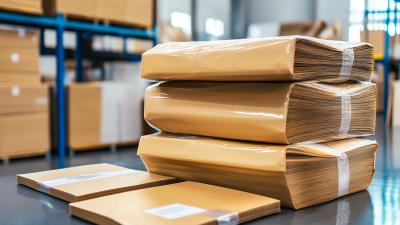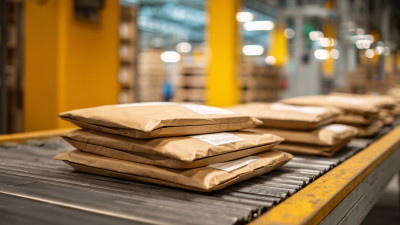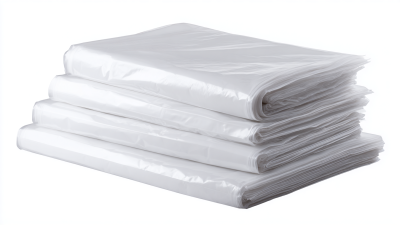
Addressing the Challenges of Poly Mailer Bags in E-commerce: Industry Insights and Solutions
The rise of e-commerce has revolutionized the retail landscape, with poly mailer bags becoming a preferred choice for shipping lightweight items due to their durability and cost-effectiveness. According to a report by Smithers Pira, the global market for flexible packaging, including poly mailer bags, is projected to reach $300 billion by 2024, reflecting a robust growth driven by the e-commerce sector. However, with this growth comes several challenges, such as environmental concerns and the need for improved recycling solutions. As businesses seek to optimize their shipping strategies, understanding the comparative advantages and disadvantages of poly mailer bags versus other packaging alternatives is critical. This blog will explore the insights from industry experts and examine innovative solutions to address the pressing issues surrounding poly mailer bags in the competitive e-commerce landscape.

Understanding the Environmental Impact of Poly Mailer Bags in E-commerce
The rise of e-commerce has revolutionized the way products are packaged and shipped, with poly mailer bags becoming a popular choice for many businesses. These lightweight and durable bags are often favored for their cost-effectiveness and convenience; however, their environmental impact is a growing concern. Made primarily from plastic, poly mailer bags contribute significantly to waste, especially considering the increasing volumes of online shopping. The challenge lies in balancing the operational efficiency provided by these bags with sustainable practices that address their detrimental effects on the environment.
To mitigate the environmental concerns associated with poly mailer bags, the industry is exploring various solutions. Many companies are beginning to adopt biodegradable or compostable mailers, which break down more easily in landfills compared to traditional plastic options. Additionally, the emphasis on recycling and circular economy practices is gaining traction, encouraging consumers to return used mailers or businesses to implement take-back programs. By prioritizing eco-friendly alternatives and encouraging responsible disposal, e-commerce can significantly reduce the ecological footprint of poly mailers while still meeting customer expectations for reliable and efficient shipping.
Environmental Impact of Poly Mailer Bags in E-commerce
Best Practices for Sustainable Alternatives to Poly Mailer Bags
As the e-commerce industry continues to flourish, the environmental impact of packaging materials, particularly poly mailer bags, has come under scrutiny. While they are lightweight and convenient, these plastic bags contribute significantly to pollution and waste. Transitioning to sustainable alternatives is not only a necessity for the environment but also a key factor in appealing to eco-conscious consumers.
One effective solution is the use of biodegradable mailer bags made from materials like cornstarch or recycled paper. These alternatives break down more quickly than traditional plastic, reducing landfill contributions. Additionally, utilizing reusable packaging can significantly cut down on waste. Retailers can encourage customers to return bags for reuse or switch to durable containers that serve multiple purposes. Furthermore, incorporating transparent labeling that highlights eco-friendly values can resonate well with customers, fostering brand loyalty while promoting sustainability.
By adopting these best practices, e-commerce businesses can mitigate the negative impacts of their packaging choices, paving the way for a more sustainable future. Investing in greener solutions not only supports environmental health but also positions brands as leaders in corporate responsibility, ultimately benefiting both the planet and their bottom line.

Innovative Technologies in Poly Mailer Bag Production for E-commerce
The rise of e-commerce has significantly increased the demand for packaging solutions, particularly poly mailer bags. These bags, praised for their lightweight, durability, and cost-effectiveness, face challenges such as environmental concerns and consumer expectations for sustainability. Innovative technologies in poly mailer bag production are emerging to address these issues, ensuring that the industry not only meets market demands but also aligns with environmental goals.
Recent advancements in material science have led to the development of bio-based poly mailers, which are made from renewable resources. These innovative materials provide the same benefits as traditional plastics but decompose more easily in landfills, minimizing their environmental impact. Additionally, manufacturers are employing cutting-edge techniques like co-extrusion and recycling technologies. Such methods allow for the production of stronger, multi-layered bags that can sustain heavier items while incorporating recycled content, further reducing reliance on virgin materials.
Moreover, smart packaging technologies, such as QR codes and NFC tags embedded in poly mailers, offer enhanced tracking and consumer engagement. These innovations enable customers to get real-time updates about their shipments, improving the overall customer experience. As the e-commerce landscape continues to evolve, the adoption of these advanced technologies in poly mailer production will be crucial for brands aiming to improve their sustainability practices while maintaining efficiency and performance.
Addressing the Challenges of Poly Mailer Bags in E-commerce: Industry Insights and Solutions
| Challenge | Insight | Proposed Solution | Innovative Technology |
|---|---|---|---|
| Environmental Impact | Growing concern over plastic waste and pollution. | Adoption of biodegradable and recyclable materials. | Bioplastics made from renewable resources. |
| Cost Efficiency | High production costs can be a hinderance. | Bulk purchasing and local sourcing of materials. | Automated manufacturing processes that reduce labor costs. |
| Durability Issues | Poly mailers can tear during transit. | Testing materials for improved strength and resilience. | Advanced polymers used for enhanced durability. |
| Consumer Awareness | Lack of knowledge regarding sustainable options. | Educational campaigns on the benefits of eco-friendly materials. | Digital platforms for better consumer engagement. |
| Supply Chain Variability | Disruptions can affect material availability. | Diversifying suppliers and stock management. | Blockchain technology for tracking and transparency. |
Consumer Insights: What Shoppers Think About Packaging in Online Purchases
As e-commerce continues to flourish, consumer attitudes towards packaging have become a crucial consideration for brands aiming to enhance customer satisfaction. Recent studies indicate that 72% of online shoppers consider packaging to be an important factor in their purchasing decisions. Consumers are increasingly concerned about sustainability, with 66% of respondents in a 2022 report stating they prefer brands that utilize eco-friendly packaging solutions. This trend showcases an urgent need for e-commerce businesses to address packaging methods, especially with the rising popularity of poly mailer bags.
In addition to sustainability, there is a growing expectation for packaging to protect products during transit. According to a survey conducted by the Packaging Innovation Institute, 53% of consumers reported that they have received damaged goods due to inadequate packaging. This has led to a surge in demand for sturdy yet environmentally responsible options. Companies are exploring alternatives to traditional poly mailer bags, such as compostable materials and recycled content solutions, which not only meet consumer preferences but also align with broader industry initiatives aimed at reducing packaging waste. By understanding and adapting to these consumer insights, e-commerce businesses can foster loyalty and improve their overall brand image in a competitive market.
Effective Strategies for Reducing Waste from Poly Mailer Usage in the Industry
The rise of e-commerce has led to an exponential increase in the use of poly mailer bags, which unfortunately contributes significantly to plastic waste. To combat this issue, it is essential for the industry to adopt effective strategies aimed at reducing the environmental impact of poly mailer usage. One promising approach is the transition to biodegradable or recyclable materials, which can mitigate waste accumulation while maintaining the durability required for safe product shipping.

Another critical strategy involves optimizing packaging design. By utilizing mailers that are appropriately sized for the products being shipped, companies can minimize excess material and reduce the overall volume of packaging waste. Furthermore, implementing a return program for mailers allows customers to send back their used bags for recycling, fostering a circular economy and encouraging environmental responsibility among consumers.
Education plays a vital role in these initiatives; businesses should actively promote awareness about sustainable practices and the importance of reducing plastic waste. By engaging customers in sustainability efforts, the e-commerce sector can pave the way for a greener future while maintaining efficient operations.
Related Posts
-

China's Premium Quality Large Poly Mailers Your Trusted Global Partner
-

Elevate Your Business with Poly Mailer Bags at the Record-Breaking 137th Canton Fair 2025!
-

The Ultimate Guide to Choosing the Best Large Poly Mailers for Your Business
-

Exploring the Unique Features and Applications of Premium Large Poly Mailers
-

How to Identify Top Suppliers for Best Large Poly Mailers: A Comprehensive Guide with Industry Insights
-

5 Tips for Choosing the Best Large Poly Mailers for Your Shipping Needs



